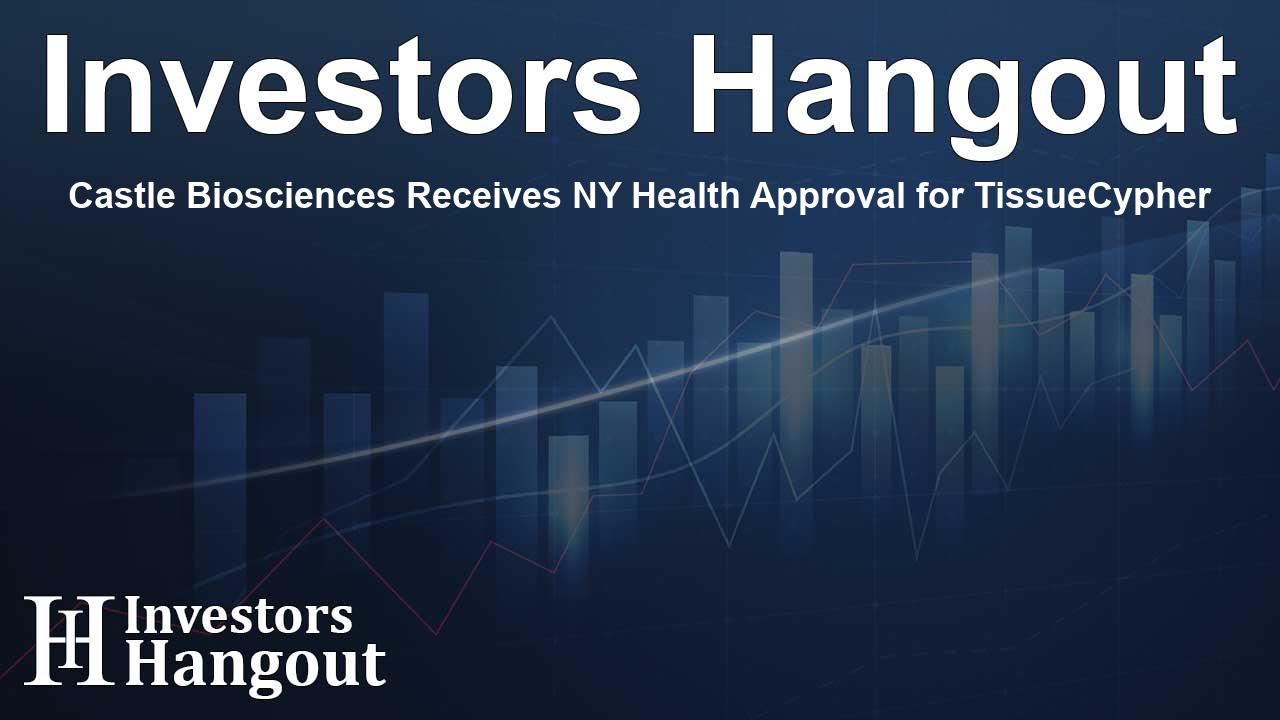Castle Biosciences Receives NY Health Approval for TissueCypher

Castle Biosciences Gains Approval for Revolutionary Test
Castle Biosciences, Inc. (NASDAQ: CSTL), based in Friendswood, Texas, is charting a transformative course in healthcare with its recent approval from the New York State Department of Health for its TissueCypher Barrett’s Esophagus test. This achievement marks a significant milestone as TissueCypher stands out as the first artificial intelligence-powered precision medicine test that accurately predicts the risk of progression from Barrett’s esophagus (BE) to esophageal cancer.
Importance of TissueCypher in Clinical Practice
Kristen Oelschlager, the chief operating officer of Castle Biosciences, expressed pride in the expanded clinical laboratory permit, emphasizing that this full approval underscores the organization's dedication to high-quality, molecular testing that aids in informed treatment decisions, ultimately enhancing the lives of patients diagnosed with BE.
Derek Maetzold, the company’s president and CEO, highlighted the comprehensive and rigorous Nature of the approval process in New York, which evaluates every aspect of a diagnostic test's performance. This successful review not only assures medical professionals but ensures patients across the nation can access a crucial prognostic tool.
The Growing Need for Effective Testing
Currently, approximately 5% of adults in the United States are affected by Barrett’s esophagus, a condition triggered by chronic gastroesophageal reflux disease (GERD). This condition alters the cells in the esophagus and serves as a precursor to one of the most aggressive forms of cancer. Notably, esophageal cancer is rapidly becoming one of the leading causes of cancer-related deaths in the United States, with a dismal five-year survival rate of only 22%.
The TissueCypher test takes a proactive approach by analyzing specific cancer-associated biomarkers and spatial biology features, enabling it to identify a molecular signature indicative of BE progression before physical changes occur in the esophageal tissue. Such insight allows clinicians to tailor their surveillance approaches to individual patients, potentially intervening earlier to avert the onset of cancer.
Understanding the TissueCypher Test
The TissueCypher Barrett’s Esophagus test is designed specifically for patients presenting with endoscopy-confirmed Barrett’s esophagus. This includes cases that are non-dysplastic, indefinite for dysplasia, or low-grade dysplasia. The test's innovative approach has been validated through 14 peer-reviewed publications in collaboration with leading clinical facilities worldwide. Furthermore, it received Advanced Diagnostic Laboratory Test (ADLT) status from the Centers for Medicare & Medicaid Services in 2022, further cementing its credibility in the medical community.
About Castle Biosciences
Castle Biosciences, trading under NASDAQ: CSTL, remains committed to advancing healthcare through its suite of innovative diagnostic tests tailored for diverse health challenges, including cancers and mental health issues. The organization prioritizes patient care and strives to empower stakeholders—patients, healthcare providers, and investors—with actionable insights that enhance treatment methodologies.
Beyond its flagship TissueCypher test, Castle is actively engaged in research and innovation aiming to develop tests addressing various diseases with unmet clinical needs. These include evaluations for conditions such as moderate-to-severe atopic dermatitis, indicating the company's broad vision for future healthcare advancements.
Frequently Asked Questions
What is the TissueCypher Barrett’s Esophagus test?
The TissueCypher test is a precision medicine diagnostic tool that helps predict the risk of progression from Barrett’s esophagus to esophageal cancer.
Why is the approval from the New York State Department of Health significant?
This approval marks a critical achievement, allowing broader access to an innovative test that is vital in the early detection and risk assessment of esophageal cancer.
How does the TissueCypher test work?
The test analyzes biomarker patterns and spatial biology features in esophageal tissues to identify early signs of cancer progression.
What is the survival rate for esophageal cancer?
Currently, the five-year survival rate for esophageal cancer stands at only 22%, highlighting the need for effective early detection methods.
How does Castle Biosciences contribute to healthcare?
Castle Biosciences develops innovative diagnostics that guide patient care, with a focus on personalized treatment approaches and research for various health conditions.
About Investors Hangout
Investors Hangout is a leading online stock forum for financial discussion and learning, offering a wide range of free tools and resources. It draws in traders of all levels, who exchange market knowledge, investigate trading tactics, and keep an eye on industry developments in real time. Featuring financial articles, stock message boards, quotes, charts, company profiles, and live news updates. Through cooperative learning and a wealth of informational resources, it helps users from novices creating their first portfolios to experts honing their techniques. Join Investors Hangout today: https://investorshangout.com/
Disclaimer: The content of this article is solely for general informational purposes only; it does not represent legal, financial, or investment advice. Investors Hangout does not offer financial advice; the author is not a licensed financial advisor. Consult a qualified advisor before making any financial or investment decisions based on this article. The author's interpretation of publicly available data shapes the opinions presented here; as a result, they should not be taken as advice to purchase, sell, or hold any securities mentioned or any other investments. The author does not guarantee the accuracy, completeness, or timeliness of any material, providing it "as is." Information and market conditions may change; past performance is not indicative of future outcomes. If any of the material offered here is inaccurate, please contact us for corrections.